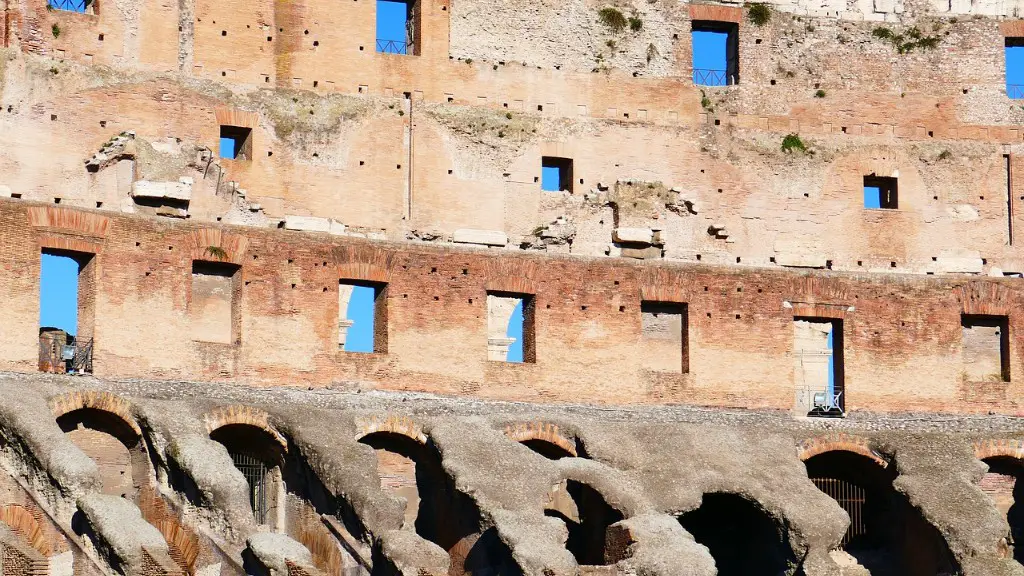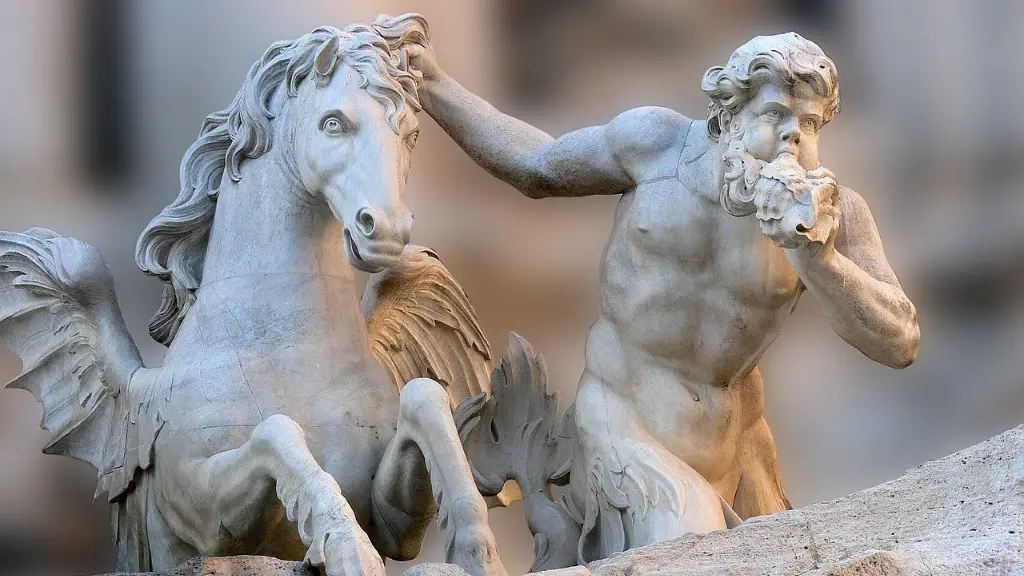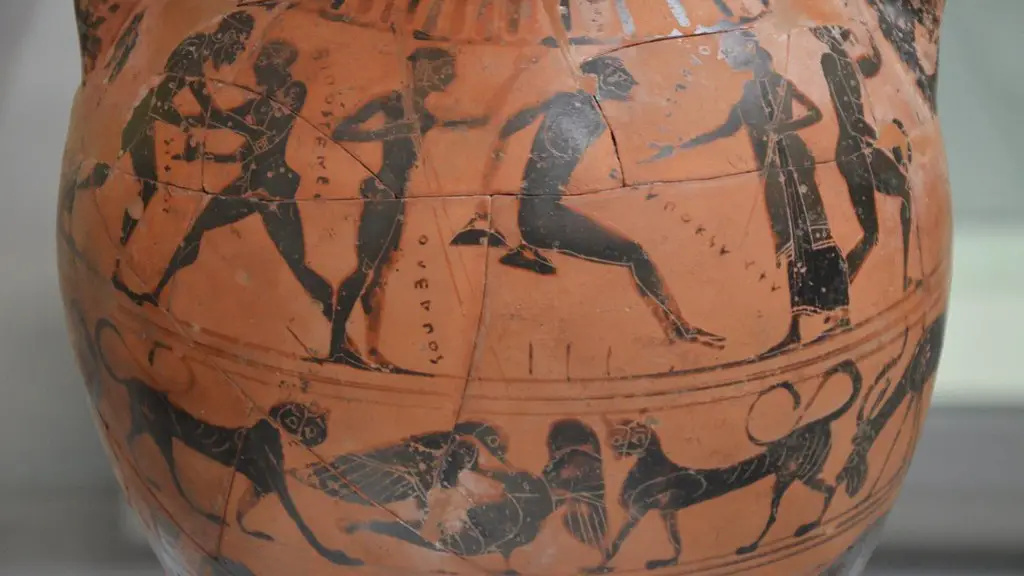Importance of Olive Oil in Ancient Rome
The production and use of olive oil was an integral part of life in Ancient Rome. It was used in their cuisine, for lighting, and for perfumes, among other things. This importance may be attributed to several reasons, such as its nutritional benefits, religious symbolism and its close ties to the Roman-Italian culture.
Olive Oil’s availability as a renewable resource was an important factor in its selection as a symbol of abundance and physical health in Ancient Rome. Olives were widely grown and cultivated around the Mediterranean. Their size and easy transportability, coupled with their durability and long-term storage capacity, made them the perfect food source for those living during the time. The oil extracted from them was used in all sorts of dishes – from savory to sweet. Not only was it a necessary part of the daily diet, its consumption was often seen as a sign of wealth and prosperity, thanks to its flavours and aromas.
In addition to its gastronomic importance, it is also well established that olive oil was used in several religious ceremonies and festivals. Ancient Romans associated this oil with the gods and goddesses of agriculture, as well as with symbols of knowledge, wisdom and power. They believed that pouring a few drops of this liquid on their altars would bring good luck and fertility. Furthermore, the people of Ancient Rome considered it to be a type of protection from the evil forces of the gods and the natural world.
Because of its many ties to the Roman-Italian culture, olive oil became an important item of trade between Rome and other civilizations in the Mediterranean Basin. In fact, it is believed that most of the oil traded came from the lesser-known Italian regions of Tuscany and Umbria. The Romans may have utilised the distribution networks of their own citizens, or the trade routes set up by the frequent traders who crossed their lands, to acquire their share of this nutritious liquid.
It is believed that olive oil was also utilised in various aspects of ancient Roman life such as medicine and cosmetics. Its healing properties and richness of vitamins made it a precious aid in the treatment of wounds and other ailments. In addition, it was believed to help strengthen the body’s youth and vigour. For beauty purposes, it was used as a hair conditioner, formassages, and to soften the skin. Moreover, a combination of olive oil and wax was used as a polish for furniture.
Overall, it is clear that olive oil played a crucial role in the daily life of Ancient Romans. It was an essential food item, as well as a symbol of wealth and fertility. It was also an integral part of religious ceremonies, medicine and cosmetics. For these reasons, it is easy to see why this liquid was so important.
Cuisines Involving Olive Oil
The cuisines of Ancient Rome included a variety of dishes that made use of olive oil. For example, the classic Roman meal, known as the cena, was often served with bread, olives, and fish that were prepared in olive oil. This meal was often accompanied by wine, which was also blended with olive oil to create a popular drink called defrutum. Other dishes, such as roasted pork and game, were marinated in olive oil for added flavor and nutrition.
Olive oil was also commonly used as a condiment in salads. The most famous of these salads was the concoction known as the garum. Originally created in ancient Greece, it was made with ground fish, spices, and vinegar and was a staple in the Roman diet. Other recipes employed olive oil as a base, such as the calidus, which was a mixture of bread, olive oil, egg, herbs and spices.
One culinary invention attributed to the ancient Romans was the use of fried vegetables. This process was thought to have been developed during the 1st century A.D. when fried vegetables were a popular addition to meals. The vegetables were usually prepared in olive oil and various herbs. This method of cooking is still employed today and is a popular way to prepare vegetables.
The presence of olive oil in Ancient Roman cuisine can be attributed to its status as a vital resource in their culture. Its use as a food item, a condiment and an ingredient for marinades can be seen in numerous traditional recipes from the region. It was an important part of Roman culinary culture for many centuries and is still a valued part of the Italian diet today.
Health Benefits
Olive oil has been documented as having a number of health benefits in both ancient and modern times. One of its main benefits is its ability to reduce cholesterol levels and triglycerides, as well as improve heart health. It is also high in monounsaturated fats, which can help reduce inflammation, blood sugar levels and improve cholesterol ratios. Additionally, it is high in oleic acid, which has been linked to improved brain function and reduced risk of cancer.
Further, olive oil’s polyphenolic compounds have been suggested to have antioxidant and antithrombotic effects. This can aid in their prevention of various diseases, and the reduction of chronic inflammation. The polyphenols can also help protect the skin from UV damage, and can act as an anti-inflammatory agent.
In addition to its health benefits, olive oil is also thought to be good for the environment. This is due to its sustainability and renewable nature. It is produced using traditional agricultural practices and does not require the use of agrochemicals or fertilizers. Furthermore, its production does not contribute to global warming, making it an environmentally friendly option.
Overall, the health benefits of olive oil are well-documented. Not only did it aid in the prevention of disease and sickness in Ancient Rome, the same benefits are still enjoyed by those consuming this nutritious liquid today. It is easy to see why its use was so highly regarded in the past.
Creating an Industry
In addition to its use as a food source and a religious symbol, olive oil was also used to create an industry in Ancient Rome. This industry revolved around the production and sale of the oil, as well as the creation of other products related to it. This included items such as soap, ointments, perfumes and cosmetics.
Soap was an important commodity for the Romans as it was used for daily hygiene and to keep the body and one’s clothes smelling fresh. Olive oil was used as a base for the soap which was favoured for its mild scent and moisturizing properties.Ointments were also created from the oil and were known for their healing and medicinal purposes, while perfumes and cosmetics were derived from it as well.
The olive oil industry flourished during the time of Ancient Rome. Several statutes that regulated this trade have been found, indicating the importance it was given in their society. Maintaining the quality of the oil was also considered a major concern for the producers. This was achieved by only pressing the olives when fully ripe, as well as using different kinds of baskets for separating the oil from the dense pulp.
The presence of an olive oil industry in Ancient Rome is proof of its impact on their culture. This industry was well-structured and shows that the importance of this liquid ran well beyond its use as a food and a religious symbol. It demonstrates how its production and sale could help create an economy that could sustain an entire civilization.
Socio-Cultural Influence
Olive oil was also an important part of Ancient Roman society not only in terms of physical nutrition and health, but also in its socio-cultural implications. It was often used as a symbol of status and prestige, with wealthier classes enjoying higher-quality varieties. This social disparity is evident in the fact that during banquets, guests of higher statures would be served with better-quality varieties of the oil.
Along with this, it was also linked to certain virtues and values, such as strength and courage. In particular, olive oil was attributed to the military, with those of higher ranks receiving more luxurious brands of the oil. This symbolism was also present in Ancient Roman art and literature, further outlining its importance in the culture.
In conclusion, it is clear that olive oil had a significant impact on Ancient Rome. It was used for a variety of purposes, including nutrition, medicine, beauty, and religious ceremonies. In addition, it was closely linked to the socio-economic structure, as well as the cultural ideologies of the time. This is what continues to make it such an iconic and important part of Roman history.
Olive Oil and Trade
Olive oil was an important commodity in the trade networks of Ancient Rome. This liquid was usually exported and imported by merchants who travelled along the major trade routes of the Mediterranean. These merchants would acquire their supplies from the local farmers and then ship them to the nearest cities and ports. Once there, the oil was bought and sold at a premium price.
The Romans also recognised the importance of having a quality product. To guarantee its quality, merchants employed several strategies. One of these strategies was the use of sealed amphorae, which were used as containers to store and transport the liquid. These amphorae would usually be made of terracotta and stamped with the merchant’s name, thus indicating its authenticity.
In addition to its importance as a commodity, olive oil’s importance was also reflected in the tax system of Ancient Rome. All the revenues obtained from the oil business would flow directly to the state’s coffers. This was because it was deemed a royal luxury by the government and its merchants could be penalised for selling it. As a result, it was heavily taxed and monitored.
As demonstrated, olive oil was an important factor in the economy of Ancient Rome. Its presence as a trade commodity allowed for increased wealth and resources in the region. It can be argued that without its presence in the region, Ancient Rome may never have achieved its level of prosperity and power.
Trade and Long-term Impact
The trade of olive oil in Ancient Rome had a lasting impact not only on the region, but on the world as a whole. In the centuries to come, its importance would be remembered and echoed around the world. For example, the olive branch became a symbol of peace and prosperity, while the process of crushing olives to obtain oil is still practiced today.
The trade also opened the door for other trade routes in the region. In particular, the establishment of the silk roads was attributed to the merchants travelling along the Mediterranean to acquire olive oil. This facilitated the transmission of knowledge, ideas and technologies between the Middle East and Europe. Without the oil business, these trade routes may have never been opened.
Finally, the use of olive oil made a lasting impact on the cuisine of the Ancient Mediterranean. What began as a necessity of the region quickly turned into a high-value commodity, which helped to shape the gastronomy of the entire Mediterranean. Its use as an ingredient can still be seen in many traditional recipes from the area.
Olive oil’s importance can be seen in many aspects of life in Ancient Rome, and it is no surprise that its influence still resonates today. From its early use as a culinary source to its eventual spread as a trade commodity, olive oil left a lasting mark on the world.





